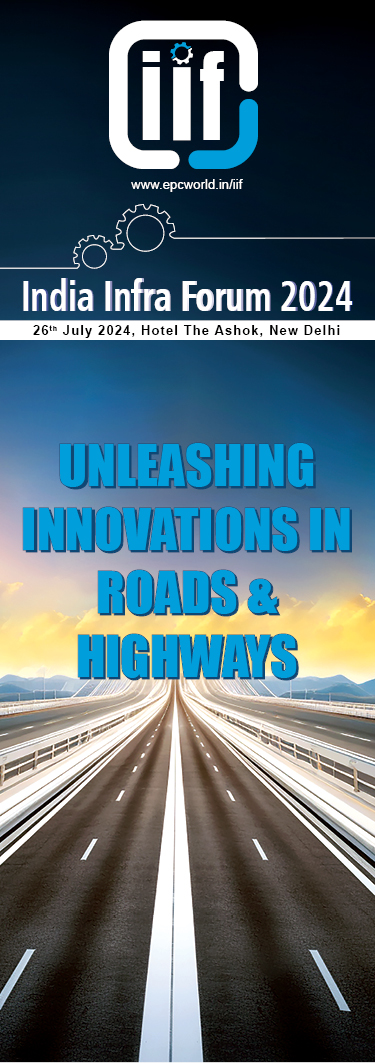Over the years, the Indian infrastructure and construction industry has seen numerous changes and has now even embraced the digital/real time-based operations. What brought you to India and what are your priorities set for the betterment of the Indian infra-construction sectors?
India’s infrastructure and construction sector are crucial to India’s economic ecosystem. With the development of world-class facilities like roads, waterways, railways, airports, and ports across the country the public and private sectors are playing a critical role in the growth of the country. In fact, India is poised to become the world’s third-largest construction market by the end of 2022. The sectors are also India’s biggest job providers. However, they are also known to be the most hazardous sectors. The number of fatalities reported per day is very high. This is due to the absence of proper safety standards, protocols, and practices. We believe that with proper safety measures in place, these deaths can be prevented. This situation is in sharp contrast to Britain, where fatalities are significantly lower. This suggests that India could learn valuable lessons from countries like the UK where the health and safety record of the construction industry has significantly improved in recent years. There is a great need in India for a culture change regarding the way that risks to workers’ health, safety, and wellbeing are managed, including during construction work. British Safety Council’s priority is to help the industry achieve the very highest health and safety standards for its people. We hope to achieve this by offering our globally acclaimed safety products and services to the Indian industry.
The organization has developed more complex and has spread its wings wider today. How well do you see yourself representing the Group’s expertise in the Indian economic sectors?
British Safety Council promotes excellence in workplace health, safety, and environmental management across the world. We have members in more than 60 countries. As a not-for-profit membership organisation, we work with our members to develop best practices. We use our resources to help reduce risk, prevent injuries and promote health and well-being in the workplace. For over 30 years, we provided our world-leading products and services to the Indian market from our head office in London. Our Mumbai office was set up in 2017 and since then our local team has been delivering prompt and comprehensive services to both our existing and new customers, benefiting from local knowledge and first-hand experience of working in India. Our clients today include some of India’s largest corporations from the manufacturing, construction and infrastructure, and oil and gas sectors.
With your global experience share with us your analysis of the operational practices being followed in India.
For over 60 years, the British Safety Council has been campaigning to protect workers and improve workplace conditions and practices, both in Britain and around the world. In India, around 80% of the estimated 465 million-strong workforce is not protected by the existing health and safety legal framework. Overall, workplace deaths in India are 20 times higher than in the UK: it is estimated that there are 48,000 work-related deaths in India each year, while there were 144 workplace fatalities in Britain in 2017. In the UK, employers have a legal duty to carry out a suitable assessment of the risks to their workers’ health and safety. In India, in contrast, many employers, including those in the construction sector, do not show enough care for the health and safety of their workers. Workers in the construction industry in India are poorly trained because their employers know that they are easily replaced. Most workers end up in construction as a last resort because the working conditions in the sector are very difficult. They are not given adequate training by the contractors who, recognising the temporary status of their workers, do not invest in their training or their health and safety. In addition to the high risk of being killed or seriously injured in site accidents, construction workers in India face the risk of developing serious and often fatal health conditions and diseases due to exposure to various health hazards. These include musculoskeletal disorders (such as serious back injuries), caused by unsafe manual handling of loads; and disabling and often fatal respiratory diseases, such as silicosis from exposure to dust while cutting and grinding up stones. There is a great need in India for a culture change with regard to workplace health, safety, and wellbeing. Legislation is very important in helping to bring about this change, but safety culture needs safety leaders who will champion it every day and at every level. Over the years that the British Safety Council has been working in India, we have been very impressed by the business leaders who have been willing to stand out and show that safety and health are a crucial part of what they do. We are encouraging more such leaders to emerge and make the difference the country needs.
What are the main challenges that we need to overcome and your strategy for addressing the same? Could you highlight a few of your key clients from the Indian infra-construction space?
The world of work is rapidly changing, bringing both opportunities and considerable risks not only to businesses, the economy, and the environment but also to the wellbeing, health, and safety of employees. Employers must gain an understanding of what’s in store and take a strategic view of how to deal with these challenges. The World Bank predicts that over the next 20 years, 69 per cent of jobs in India will be threatened by automation or the use of artificial intelligence. Moreover, the population in India aged over 65 will double over the next 30 years and this, together with the predicted growth in the gig economy, means that workers will be at much greater risk of accidents and ill-health, while the always-on culture will lead to higher levels of stress, anxiety, and depression. These are just some of the challenges that will pose considerable risks to companies and their workforces. Our clients include some of the top real estate and infrastructure companies in India. I am pleased to say that many scored well on health, safety, and wellbeing by bagging a significant number of International Safety Awards this year. The winners include Panchshil Realty, Larsen & Toubro India, Gail India, Indian Oil, JSW Steel, Tata Projects, Sembcorp Green Infra, Godrej Properties, Nokia Solutions & Networks India and NTPC among others
Take us through the solutions/services that will be offered here for the betterment of the industry’s working environment. What are the key factors considered while offering services to the Indian markets?
British Safety Council is a not-for-profit membership organisation, and we work with our members to develop best practices in health, safety, wellbeing, and environmental management. All our resources are used to help reduce risk, prevent injuries and promote health and well-being in the workplace. In India, we offer training programs and qualifications, audit and consultancy services, and award and recognition platforms for the betterment of health, safety, wellbeing, and environmental management practices. We offer construction health and safety courses specifically tailored to the construction industry so that participants can gain the necessary skills to keep their sites and employees safe. We also offer NEBOSH health and safety courses to ensure that managers and supervisors can minimise the risk of construction activities. Our high-risk operations safety audit is an in-depth audit of situations that could potentially cause serious injuries and harm to people and property and assists organisations to focus on these activities. The audit actively looks at high-risk activities such as working at height, confined space entry, lifting operations, ground excavation, electrical safety, fire safety management, and contractor safety.
Our safety culture change programme – Step Change in Safety Culture, is suitable for any organisation that wishes to develop and sustain a positive health and safety culture – whether from an initial stage or those looking to improve their existing culture. Participants could visualize that safety culture is measurable. Safety culture surveys will help organizations to identify gaps and fill them step by step, leading toward building a strong safety culture. We also offer Five Star Environmental Audit services for businesses in India. The audit offers an in-depth examination of an organisation’s entire environmental management system and associated arrangements. By examining policies, processes, and practices and recommending improvements, the audit will help companies improve their environmental sustainability performance. These are just some of the programs from the extensive Health, Safety, and Wellbeing catalogue we offer in India.
What according to you are the greatest opportunity and the greatest risk for employers to address today? How mature is India today when compared to its western counterparts?
Going by what we are seeing in India today I think the greatest opportunity is that the leadership in most Indian companies is aligned with promoting safer and healthier workplaces. The tools, technology, and expertise for enabling better safety, health, and wellbeing practices are also available. Companies can now move the needle from having an unfocussed and reactive approach to safety, to establishing a proactive and exemplary safety culture. This is a great opportunity. Compared to its western counterparts I think India lags when it comes to percolating a safety culture and implementing it across all levels of the organisation. The greatest risk for employers is to have an unsafe workplace. This poses risk to life, can disrupt business continuity, and increase overall costs.
British Safety Council has always associated health and safety with climate change and environmentally cautious behavior. Could you throw some light on your work on this front?
We introduced our Five Star Environmental Audit services for businesses in India. The audit offers an in-depth examination of an organisation’s entire environmental management system and associated arrangements. By examining policies, processes, and practices and recommending improvements, the audit will help companies improve their environmental sustainability performance. The audit is a specialised service. It goes beyond the requirements of traditional environmental management systems such as ISO 14001. Organisations who undertake this audit demonstrate their commitment to environmental and sustainability best practices to their customers, supply chains, and other stakeholders. The audit can also help organisations be more resource-efficient and cost-effective.
The Indian Government mulls strongly on pushing infrastructure and construction as its core growth agendas. How much has been the Governmental support in encouraging your operations? In the way forward, what will be the British Safety Council’s role in supporting India’s infra-construction industries?
Most State Governments have started initiating many proactive safety measures. These include providing funding for structured training initiatives by construction companies, providing free PPE and heat stress kits during summer months, organizing promotion campaigns on major project sites, etc. Good safety standards also exist in metro projects and highway (both greenfield and brownfield) projects, particularly, if they are funded by international agencies. Construction projects inside hazardous industries such as oil & gas, and steel plants also have good safety standards. The Indian Government has also initiated competence building among the construction workmen through the National Skill Development Corporation. While there are many such initiatives to ensure safety, they are mostly inconsistent with progress. British Safety Council will continue its efforts to ensure greater workplace health, safety, and wellbeing. We have seen a growing demand from the infra-construction sector for services such as training, audit and consultancy, e-learning, and safety culture change consultancy. We intend to take our Safety Culture event to other cities in India, including Delhi and Bangalore, over the coming months.






